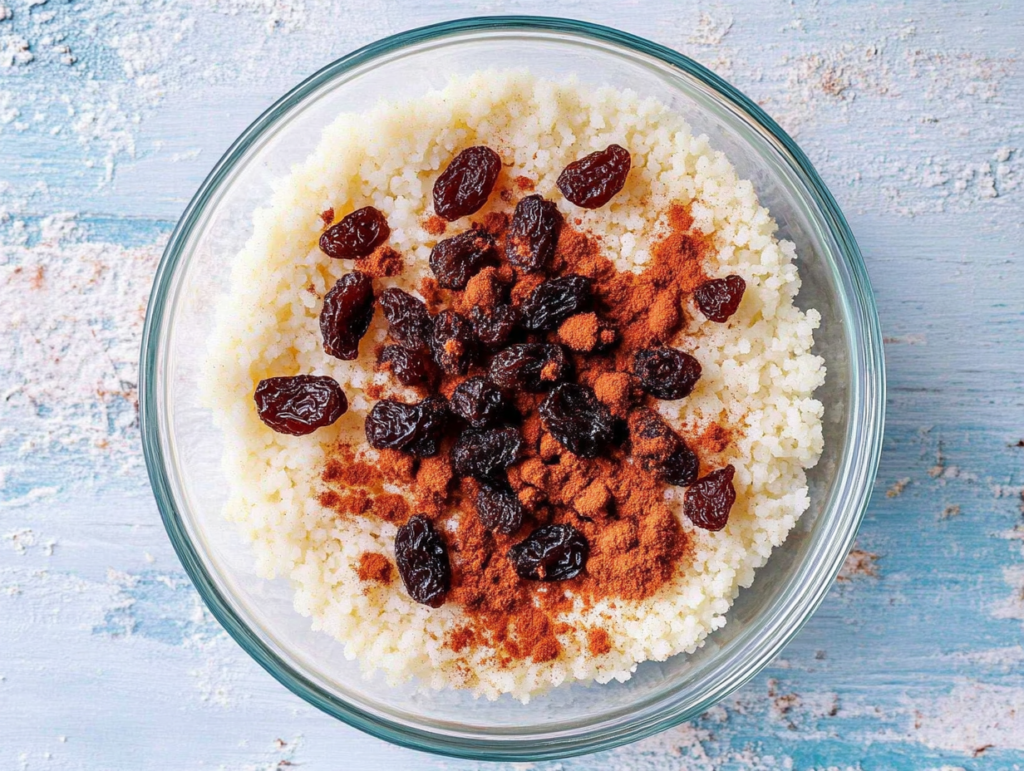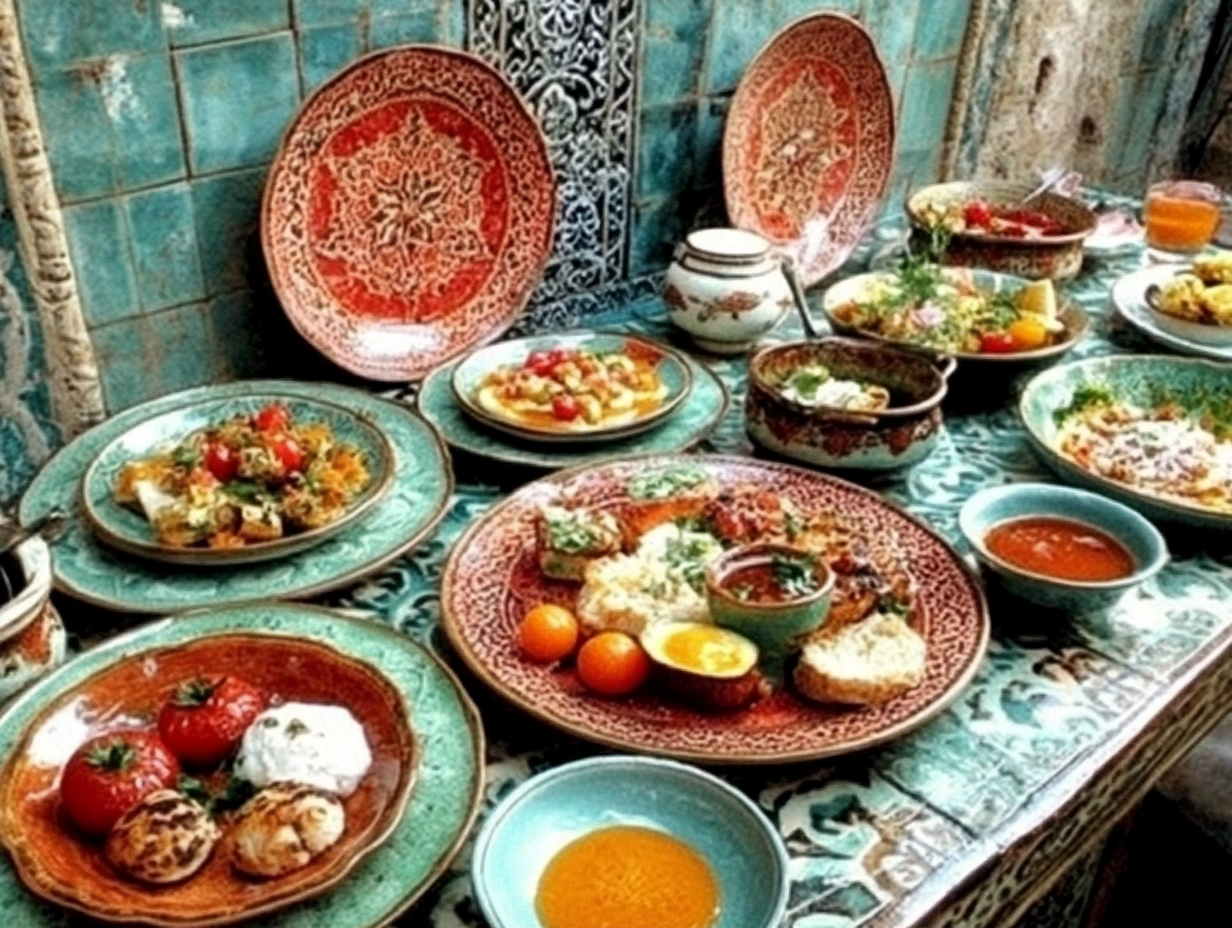Introduction
Moroccan breakfast is a delightful and flavorful way to start your day, filled with aromatic spices, fresh bread, and hearty dishes that provide energy and nourishment. If you love discovering new breakfast ideas, this guide will take you through the best Moroccan breakfast dishes that you must try. Moroccan cuisine is deeply rooted in tradition, and breakfast is no exception. Each dish is prepared with love and care, often passed down through generations, making it a truly special experience.

1. Moroccan Mint Tea – The Iconic Start to Every Breakfast
A Moroccan breakfast wouldn’t be complete without a glass of traditional Moroccan mint tea. Made with fresh mint leaves, green tea, and plenty of sugar, this refreshing drink is served in small glasses and poured from a height to create a foamy top. The tea is typically brewed in a special teapot called a “berrad” and is infused with mint for a cooling effect. Moroccan mint tea is not just a beverage; it’s a symbol of hospitality and is often served to guests upon arrival. The combination of the slightly bitter green tea with the sweetness of sugar and the freshness of mint makes it an essential part of any Moroccan breakfast table.

2. Msemen – Flaky Moroccan Pancakes
Msemen are square-shaped, flaky Moroccan pancakes made with flour, semolina, and butter. They can be served with honey, jam, or even stuffed with spiced fillings for a savory treat. The preparation involves kneading and folding the dough multiple times to achieve the characteristic flaky texture. Msemen can be enjoyed plain, but many Moroccans love pairing it with honey or Amlou, a rich almond and argan oil spread. Some versions of Msemen are stuffed with minced meat, onions, and spices, transforming them into a savory delight perfect for breakfast or a midday snack.
3. Baghrir – Thousand Hole Pancakes
Known as Moroccan crêpes, Baghrir are soft, spongy pancakes made with semolina and yeast, creating their signature “thousand holes” texture. They’re usually drizzled with honey and butter. The tiny holes on the surface of Baghrir are created by the yeast fermentation process, making them light and airy. This dish is a favorite among Moroccans because it absorbs flavors well, especially when paired with melted butter and honey. Unlike traditional pancakes, Baghrir is cooked on only one side, which contributes to its unique texture and softness.
4. Harcha – Semolina Bread Delight
Harcha is a pan-fried semolina bread with a crispy crust and soft interior. It’s often served with butter, jam, or cheese, making it a popular choice for a Moroccan breakfast. The dough is made with fine semolina, milk, and butter, giving it a slightly crumbly texture. Harcha is best enjoyed warm, allowing the butter to melt into the bread, creating a rich, satisfying flavor. It can also be filled with cheese or olives for a savory variation, making it a versatile breakfast option.
5. Khobz – Traditional Moroccan Bread
Moroccan breakfast often includes Khobz, a round, crusty bread used to scoop up spreads like Amlou (a mix of almonds, honey, and argan oil) or cheese. This bread is baked in traditional clay ovens, giving it a slightly smoky flavor. Khobz is a staple in Moroccan households and is often made fresh daily. It pairs well with olive oil, honey, and even scrambled eggs, making it a perfect addition to any breakfast spread.
6. Bissara – Hearty Fava Bean Soup
For those who prefer a warm and hearty breakfast, Bissara is a thick, rich fava bean soup often seasoned with olive oil, cumin, and garlic. It’s commonly eaten with fresh bread. This dish is particularly popular in winter, as it provides warmth and sustenance. The fava beans are boiled until soft, then blended into a creamy consistency. A drizzle of olive oil and a sprinkle of paprika or cumin add depth of flavor. Bissara is often served in small bowls with Khobz for dipping, making it a comforting and nourishing breakfast choice.

7. Sfenj – Moroccan Doughnuts
Sfenj are light, airy Moroccan doughnuts, deep-fried to golden perfection and served with sugar or honey. These are a favorite street food breakfast item. Made from a simple dough of flour, yeast, and water, Sfenj has a chewy texture and a slightly crisp exterior. Vendors often sell them fresh in the morning, allowing people to enjoy them with a cup of mint tea. They are best eaten warm and are often compared to beignets or churros in terms of texture and taste.

8. Amlou – Nutty Moroccan Spread
Amlou is a delicious spread made from ground almonds, honey, and argan oil. It’s often compared to peanut butter but has a unique Moroccan twist. Amlou is rich in healthy fats and provides a natural source of energy. It’s commonly spread on bread, pancakes, or even eaten by the spoonful. The combination of almonds and argan oil gives it a smooth, creamy texture with a slightly nutty taste, making it an indulgent yet nutritious breakfast option.
9. Eggs with Khlii – Dried Meat Delight
Moroccan breakfasts often include eggs cooked with Khlii, a preserved dried meat that is rich and flavorful. It adds a unique taste to scrambled or fried eggs. Khlii is made by marinating beef in a blend of spices, drying it, and then preserving it in fat. When cooked with eggs, it releases its deep, savory flavors, creating a protein-packed breakfast dish that pairs perfectly with Khobz or Harcha.
10. Dates, Olives, and Fresh Cheese
A simple yet nutritious Moroccan breakfast often consists of fresh dates, green and black olives, and Jben (a soft Moroccan cheese). This combination is perfect for a light yet fulfilling start to the day. The sweetness of dates balances the saltiness of olives, while Jben adds a creamy texture. This trio is often enjoyed alongside mint tea, providing a refreshing and wholesome meal.
11. Traditional Moroccan Breakfast Spreads
In addition to Amlou, Moroccan breakfasts often include a variety of spreads such as honey, fig jam, and olive tapenade. These spreads add depth of flavor and can be paired with different types of bread for a satisfying morning meal.
12. Spiced Lentils – A Protein-Rich Breakfast Option
Moroccan breakfasts sometimes include a warm dish of spiced lentils cooked with garlic, tomatoes, and cumin. This dish is packed with protein and fiber, making it a satisfying and nutritious meal to start the day.
13. Sweet Couscous with Dried Fruits
A variation of the classic couscous dish, this sweet breakfast option includes steamed couscous mixed with raisins, dried figs, cinnamon, and a drizzle of honey. It is both comforting and nutritious, offering a boost of energy for the day.

14. Avocado and Almond Smoothie
A modern twist on Moroccan flavors, this creamy smoothie blends avocados, almonds, honey, and milk to create a deliciously rich and nutritious morning drink.
The Health Benefits of Moroccan Breakfast
Moroccan breakfast offers a balance of protein, healthy fats, fiber, and essential nutrients, thanks to ingredients like olive oil, nuts, and whole grains. Many dishes are rich in antioxidants, promoting heart health and digestion. The use of natural ingredients ensures a nutrient-dense meal that fuels the body for the day ahead.
How to Recreate a Traditional Moroccan Breakfast at Home
- Brew a pot of authentic Moroccan mint tea.
- Prepare a batch of Msemen or Baghrir.
- Serve with honey, Amlou, and fresh fruit.
- Include eggs with Khlii for a savory option.
- Enjoy with olives, dates, and fresh cheese.
How to Recreate a Traditional Moroccan Breakfast at Home
- Brew a pot of authentic Moroccan mint tea.
- Prepare a batch of Msemen or Baghrir.
- Serve with honey, Amlou, and fresh fruit.
- Include eggs with Khlii for a savory option.
- Enjoy with olives, dates, and fresh cheese.
Frequently Asked Questions
1. What do Moroccans eat for breakfast?
Moroccan breakfast includes a variety of dishes such as mint tea, Msemen, Baghrir, Harcha, Khobz, Amlou, olives, dates, fresh cheese, and sometimes eggs with Khlii or Bissara.
2. Is Moroccan breakfast healthy?
Yes! Moroccan breakfasts are made with natural, unprocessed ingredients such as whole grains, nuts, olive oil, and fresh produce, making them a balanced and nutritious option.
3. Can I make Moroccan breakfast at home?
Absolutely! Many Moroccan breakfast dishes, like Msemen, Baghrir, and Amlou, can be easily prepared at home with simple ingredients and traditional recipes.
4. What is the most popular Moroccan breakfast dish?
Moroccan mint tea and Msemen are among the most popular breakfast staples in Morocco, enjoyed by locals daily.
5. Do Moroccans eat a sweet or savory breakfast?
Moroccan breakfast can be both sweet and savory, with options like honey-drizzled pancakes and nutty spreads, as well as eggs with Khlii and spiced lentils.
6. What is the most popular Moroccan breakfast item? Msemen and Moroccan mint tea are among the most common breakfast choices in Morocco.
7. Is Moroccan breakfast healthy? Yes, it includes nutritious ingredients like olive oil, nuts, whole grains, and fresh dairy.
8. Can I make Moroccan breakfast dishes at home? Absolutely! Many Moroccan breakfast recipes are simple to prepare and require basic ingredients.
Conclusion
Moroccan breakfast is a feast of flavors and textures, from sweet honey-drizzled pancakes to savory egg dishes. Whether you’re looking for something light or hearty, there’s always a Moroccan breakfast option to suit your taste. Try incorporating these delicious dishes into your morning routine for a unique and flavorful start to the day!

